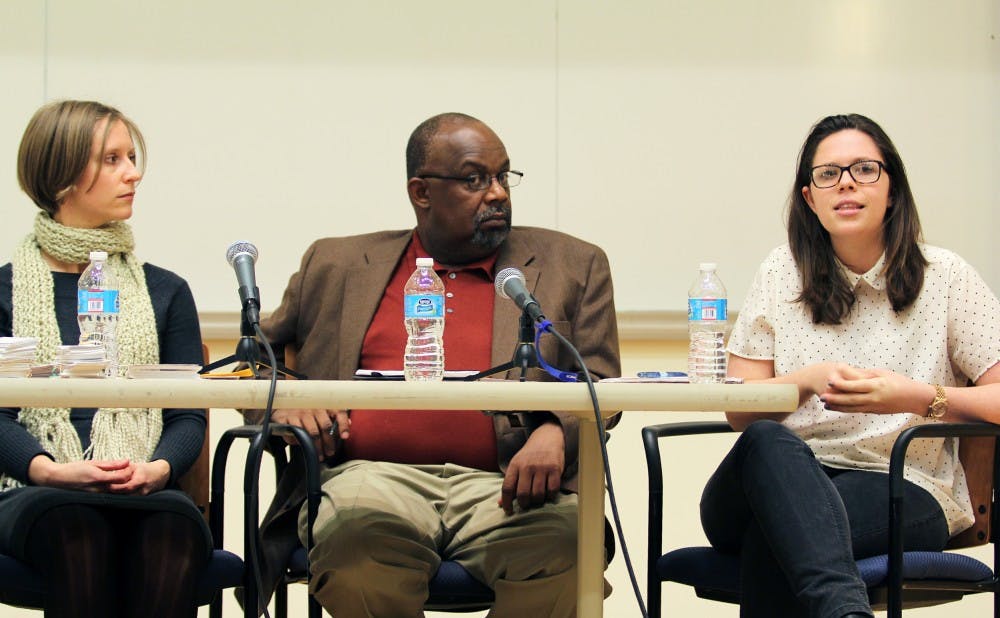As debate over voter identification laws persists in North Carolina, a lecture series put on by the Reginaldo Howard Scholarship Program hopes to bring racial justice to the table.
In a two-part lecture series this month, the program is seeking to educate the Duke community on topics related to equal protection under the law. The first part took place in White Lecture Hall Monday evening, focusing on the recurring issue of voting rights in North Carolina. The hosts, student recipients of the scholarship, first screened the short film “Section 5,” a documentary on equal protection produced in part by Reginado Howard Scholar and sophomore Ernie Britt. A panel of four activists then answered questions, encouraging the audience to fight voter suppression by trying out at polls and educating themselves about the issue.
“Equal protection should be that every eligible voter should not have their right to vote abridged,” said Jeremy Collins, a panelist and fellow at the Southern Coalition for Social Justice. “What it should be and what it means in reality are two very different things.”
The conversation also featured senior Adrienne Harreveld; Kerry Haynie, an associate professor in the political science and of African and African American Studies departments; and Jennifer Frye, associate director of Democracy North Carolina. Junior Destiny Hemphill, also a Reginado Howard Scholar, moderated the panel.
Frye outlined the major issues caused by the voter ID law that was signed by Gov. Pat McCrory in August, mainly that the law discourages minority or otherwise critical populations from voting, including but not limited to people of color, women and youths. Measures such as requiring voters to have a government-issued photo identification, cutting early voting and eliminating same-day registration is a costly, inconvenient and suppressive attempt to maintain voting integrity.
“After the Civil War during the Reconstruction, we had an opening up of the voting process,” Frye said, noting at one point there was an 80 percent voter turnout.
However, when backlash resulted in restrictive measures such as grandfather clauses and protests, “turnout tanked,” Frye said.
“That backlash perpetuated issues in N.C," she said.
Harreveld, a columnist for The Chronicle, agreed that the issue is not a new one—rather, a historical recurrence—and people must take steps to maintain the rights that have been granted and established.
“The same issues keep coming up over and over again,” she said. “Systematically there’s still so many ways racism affects outcome, whether you’re white or a person of color.”
Nash Mepukori, a sophomore from Kenya who attended the event, noted the concern she feels seeing the situation unfolding in North Carolina despite being secluded from the issue on campus.
“I wasn’t aware their rights were still being denied,” she said. “There’s so much we could be doing to help the Durham community.”
Harreveld also noted that she thinks the University as a whole could be more actively involved in encouraging people to vote, such as arranging rides to polling centers on election day.
The Reginaldo Howard Memorial Scholarship commemorates a student of the same name, the first African-American Duke student body president who died in a car accident during his sophomore year. The merit scholarship is awarded annually to students of African descent.
The second event in the annual Reggie Day lecture series will take place Monday, Feb. 24 in Dukes Divinity School and will focus on mass incarceration in North Carolina and ways to avoid it by resisting racial and class-based discrimination.
“We’re making sure we connect students with the panelists,” said Derek Lindsey, a senior and scholarship recipient who introduced the event to the audience. “It’s exciting that the the Duke population is excited to be behind it.
Get The Chronicle straight to your inbox
Signup for our weekly newsletter. Cancel at any time.

